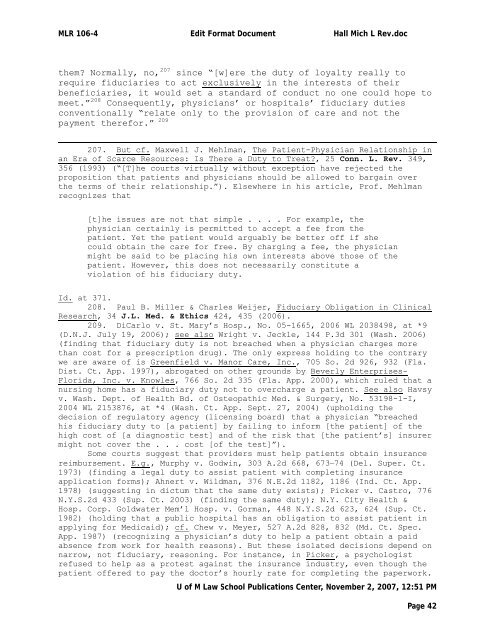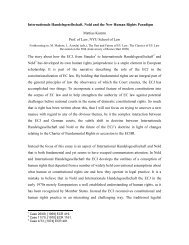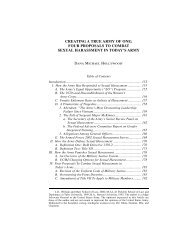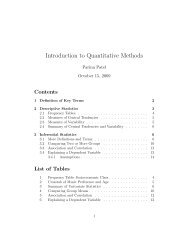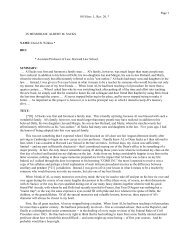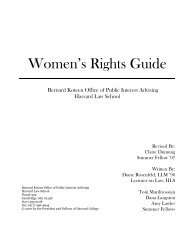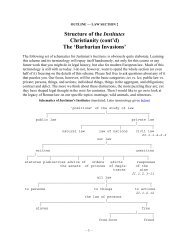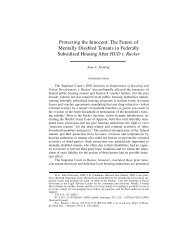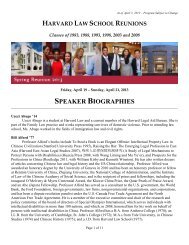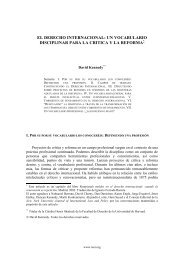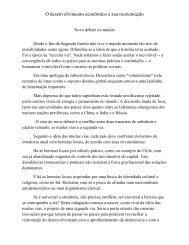Patients as Consumers - Harvard Law School
Patients as Consumers - Harvard Law School
Patients as Consumers - Harvard Law School
You also want an ePaper? Increase the reach of your titles
YUMPU automatically turns print PDFs into web optimized ePapers that Google loves.
MLR 106-4 Edit Format Document Hall Mich L Rev.doc<br />
them? Normally, no, 207 since “[w]ere the duty of loyalty really to<br />
require fiduciaries to act exclusively in the interests of their<br />
beneficiaries, it would set a standard of conduct no one could hope to<br />
meet.” 208 Consequently, physicians’ or hospitals’ fiduciary duties<br />
conventionally “relate only to the provision of care and not the<br />
payment therefor.” 209<br />
207. But cf. Maxwell J. Mehlman, The Patient-Physician Relationship in<br />
an Era of Scarce Resources: Is There a Duty to Treat?, 25 Conn. L. Rev. 349,<br />
356 (1993) (“[T]he courts virtually without exception have rejected the<br />
proposition that patients and physicians should be allowed to bargain over<br />
the terms of their relationship.”). Elsewhere in his article, Prof. Mehlman<br />
recognizes that<br />
[t]he issues are not that simple . . . . For example, the<br />
physician certainly is permitted to accept a fee from the<br />
patient. Yet the patient would arguably be better off if she<br />
could obtain the care for free. By charging a fee, the physician<br />
might be said to be placing his own interests above those of the<br />
patient. However, this does not necessarily constitute a<br />
violation of his fiduciary duty.<br />
Id. at 371.<br />
208. Paul B. Miller & Charles Weijer, Fiduciary Obligation in Clinical<br />
Research, 34 J.L. Med. & Ethics 424, 435 (2006).<br />
209. DiCarlo v. St. Mary’s Hosp., No. 05-1665, 2006 WL 2038498, at *9<br />
(D.N.J. July 19, 2006); see also Wright v. Jeckle, 144 P.3d 301 (W<strong>as</strong>h. 2006)<br />
(finding that fiduciary duty is not breached when a physician charges more<br />
than cost for a prescription drug). The only express holding to the contrary<br />
we are aware of is Greenfield v. Manor Care, Inc., 705 So. 2d 926, 932 (Fla.<br />
Dist. Ct. App. 1997), abrogated on other grounds by Beverly Enterprises-<br />
Florida, Inc. v. Knowles, 766 So. 2d 335 (Fla. App. 2000), which ruled that a<br />
nursing home h<strong>as</strong> a fiduciary duty not to overcharge a patient. See also Havsy<br />
v. W<strong>as</strong>h. Dept. of Health Bd. of Osteopathic Med. & Surgery, No. 53198-1-I,<br />
2004 WL 2153876, at *4 (W<strong>as</strong>h. Ct. App. Sept. 27, 2004) (upholding the<br />
decision of regulatory agency (licensing board) that a physician “breached<br />
his fiduciary duty to [a patient] by failing to inform [the patient] of the<br />
high cost of [a diagnostic test] and of the risk that [the patient’s] insurer<br />
might not cover the . . . cost [of the test]”).<br />
Some courts suggest that providers must help patients obtain insurance<br />
reimbursement. E.g., Murphy v. Godwin, 303 A.2d 668, 673–74 (Del. Super. Ct.<br />
1973) (finding a legal duty to <strong>as</strong>sist patient with completing insurance<br />
application forms); Ahnert v. Wildman, 376 N.E.2d 1182, 1186 (Ind. Ct. App.<br />
1978) (suggesting in dictum that the same duty exists); Picker v. C<strong>as</strong>tro, 776<br />
N.Y.S.2d 433 (Sup. Ct. 2003) (finding the same duty); N.Y. City Health &<br />
Hosp. Corp. Goldwater Mem’l Hosp. v. Gorman, 448 N.Y.S.2d 623, 624 (Sup. Ct.<br />
1982) (holding that a public hospital h<strong>as</strong> an obligation to <strong>as</strong>sist patient in<br />
applying for Medicaid); cf. Chew v. Meyer, 527 A.2d 828, 832 (Md. Ct. Spec.<br />
App. 1987) (recognizing a physician’s duty to help a patient obtain a paid<br />
absence from work for health re<strong>as</strong>ons). But these isolated decisions depend on<br />
narrow, not fiduciary, re<strong>as</strong>oning. For instance, in Picker, a psychologist<br />
refused to help <strong>as</strong> a protest against the insurance industry, even though the<br />
patient offered to pay the doctor’s hourly rate for completing the paperwork.<br />
U of M <strong>Law</strong> <strong>School</strong> Publications Center, November 2, 2007, 12:51 PM<br />
Page 42


